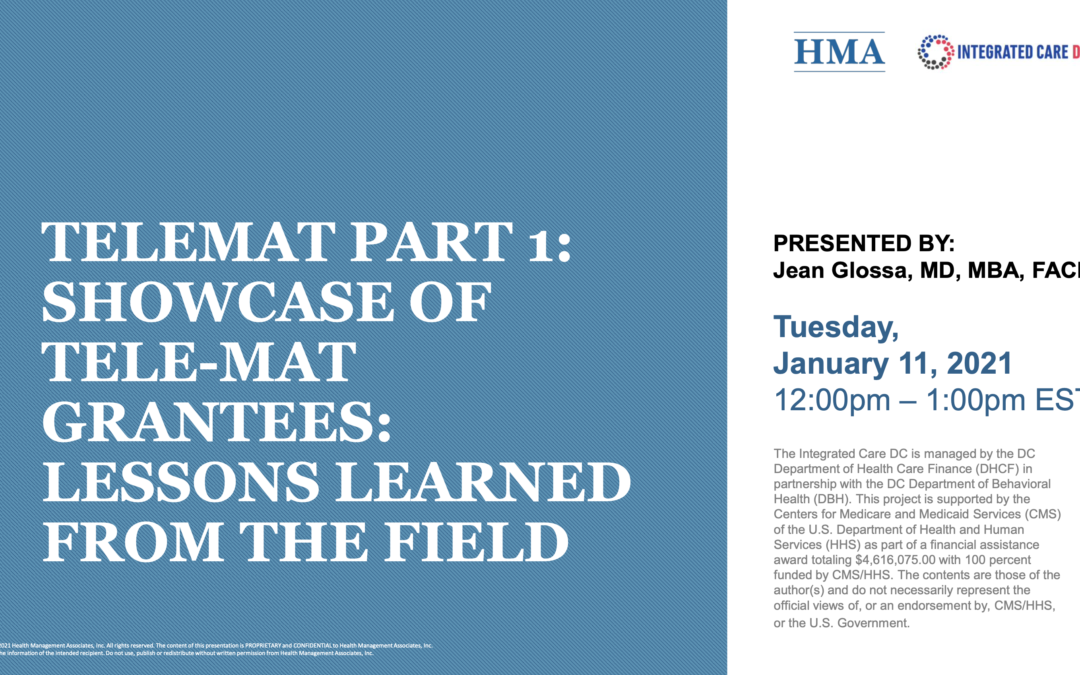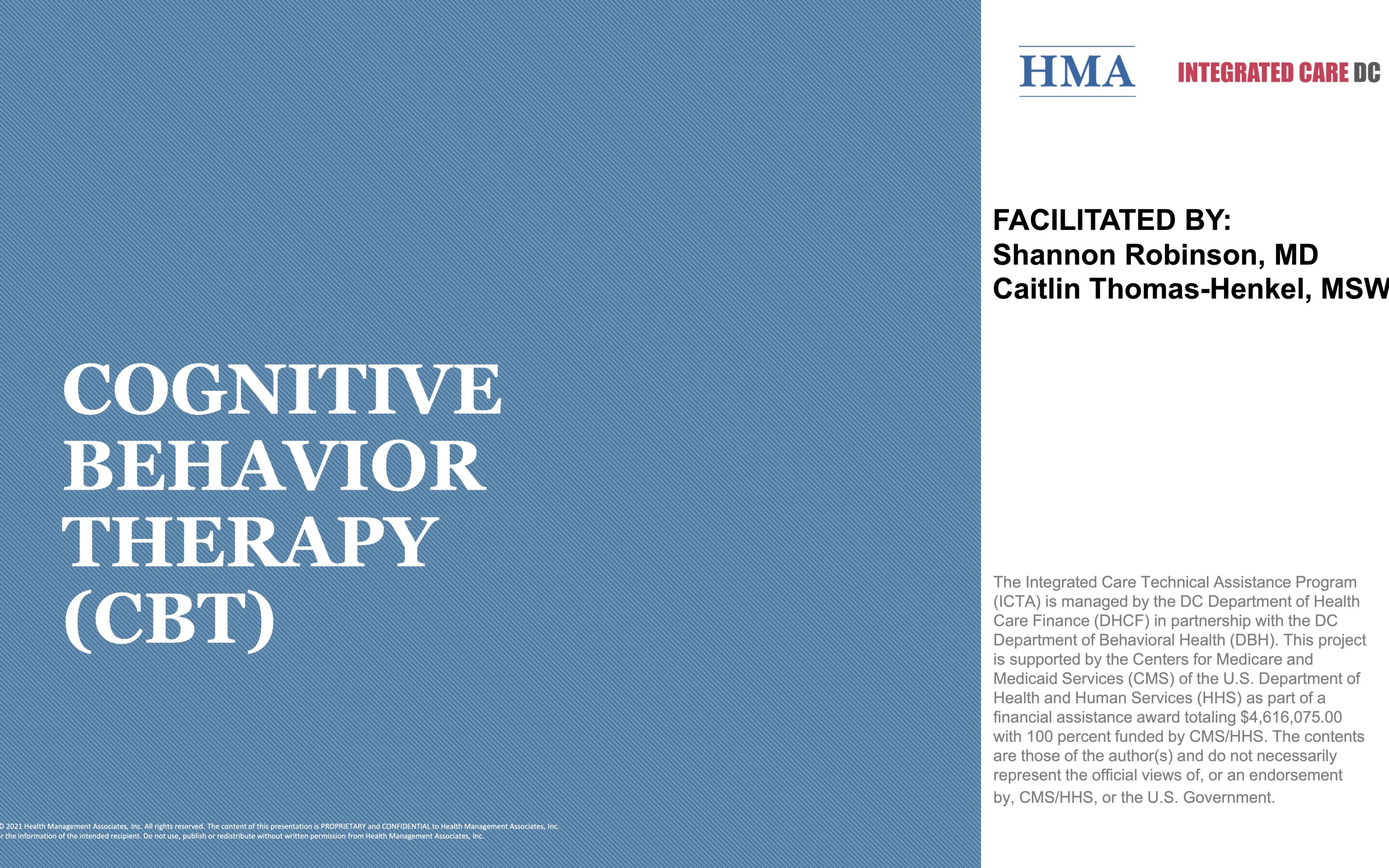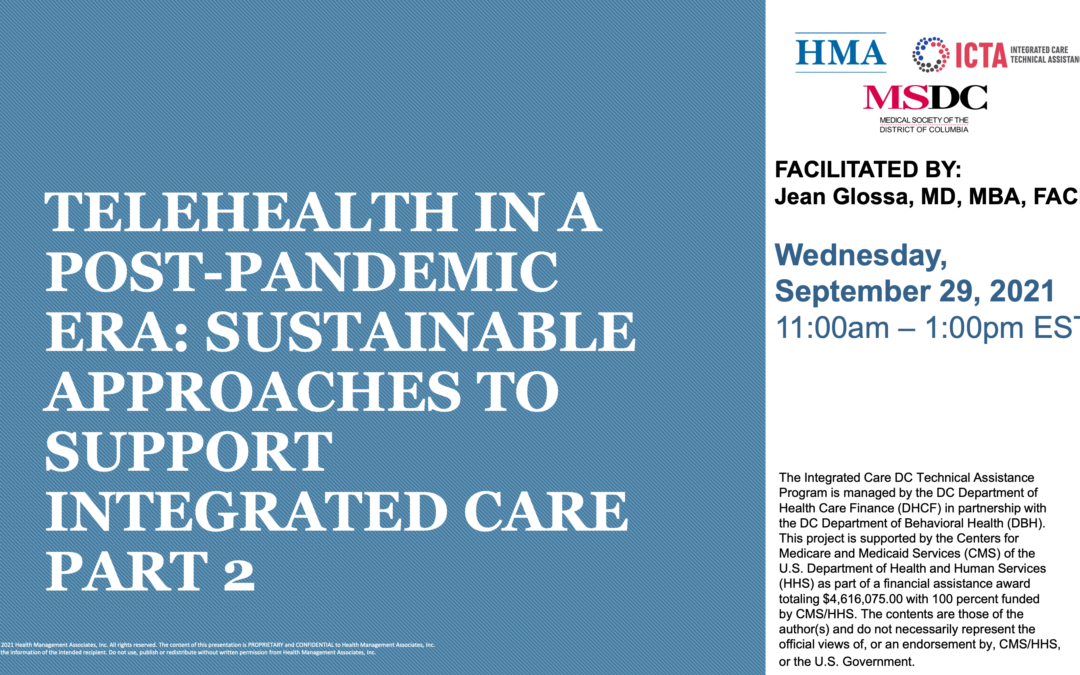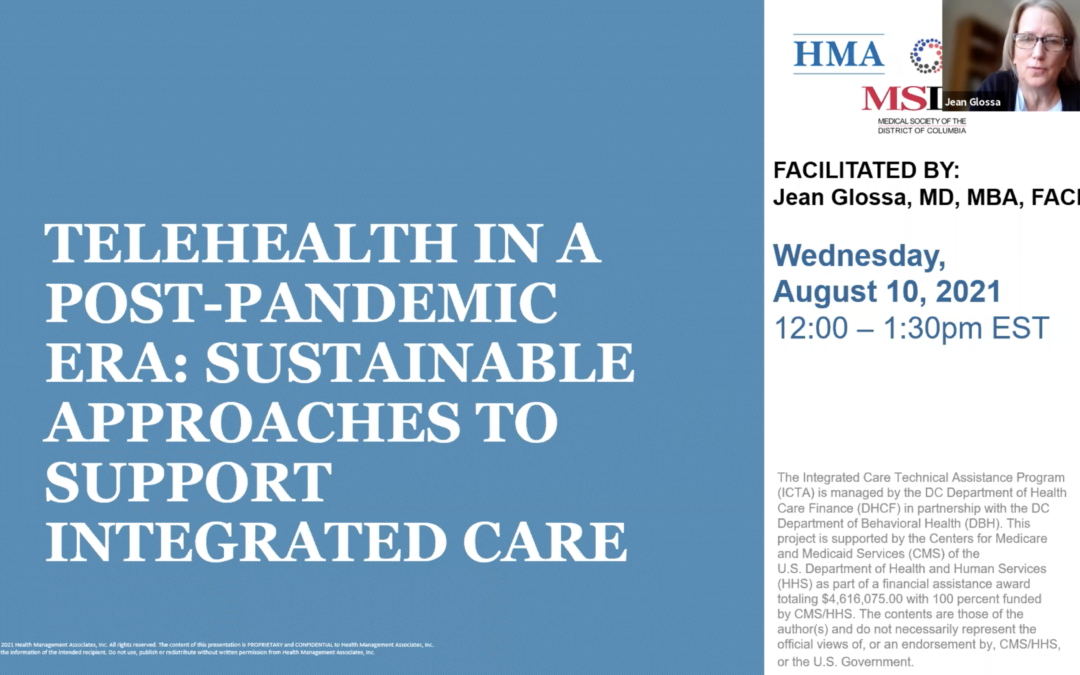Valuable Revenue Cycle Tip of the Week #5
Valuable Revenue Cycle Tip of the Week #5 is one of the FREE resources provided by Rev-Up DC, sponsored by the Department of Health Care Finance (DHCF). to help DC Medicaid Behavioral Health providers transition to participating in the Managed Care contracts.Behavioral Health Providers Responsibility in Managing Medical Conditions: Making Clinical Improvements & Meeting Quality Metrics
A 2017 RAND study found that 60 percent of American adults now live with at least one chronic condition; 42 percent have more than one. They account for hundreds of billions of dollars in health care spending every year. Individuals with serious mental illness are disproportionately impacted by our siloed physical and behavioral health systems with mortality rates 2–3 times higher than those of the general population. This disparity translates to life expectancies shortened by 10–28.5 years. It is critical that behavioral health providers understand the fundamentals of the physical health conditions that are major drivers of this early mortality so that basic health behavior interventions can be integrated into behavioral health services. Part 2 of this webinar series covers tobacco use disorder and infectious diseases. Attendees will learn how to use the 5 As model to assess need and promote lifesaving behavior changes.Valuable Revenue Cycle Tip of the Week #4
Valuable Revenue Cycle Tip of the Week #4 is one of the FREE resources provided by Rev-Up DC, sponsored by the Department of Health Care Finance (DHCF). to help DC Medicaid Behavioral Health providers transition to participating in the Managed Care contracts.Valuable Revenue Cycle Tip of the Week #3
Valuable Revenue Cycle Tip of the Week #3 is one of the FREE resources provided by Rev-Up DC, sponsored by the Department of Health Care Finance (DHCF). to help DC Medicaid Behavioral Health providers transition to participating in the Managed Care contracts.CCBHC Short Take: A Vehicle for Building & Sustaining Behavioral Health System Capacity
During this brief presentation, Kristan McIntosh, LMSW, shares an overview of what a Certified Community Behavioral Health Clinic (CCBHC) is, discusses why it is an important opportunity to build behavioral health system capacity, and talks about some upcoming opportunities to become (or partner with) a CCBHC.Mindfulness: An Evidence-Based Approach to Well-being
This short take demonstrates the use of mindfulness as a way to support stress reduction with your patients/clients. Mindfulness can be used in a wide variety of settings to help an individual get into the present moment and mitigate the effects of agitation and intrusive or racing thoughts. Mindfulness should be taught as a practice to rather than a one-time skill in order to obtain the maximum benefit. Mindfulness is a practice that has been incorporated into many treatments for depression, anxiety, and post-traumatic stress disorder and has been used with success to support individuals coping with the effects of chronic disease.Integrating Screening for Drug Use in General Medical Settings
Universal screening is key to successful detection of who needs further assessment. Additionally most providers are unaware of the power a brie intervention can have or that what they may already be doing with their patients has an evidence base to support it. This webinar will review the difference between screening and assessment and will demonstrate screening, brief intervention and referral to treatment , referred to as SBIRT. We will also review the evidence base for SBIRT and talk to a DC provider who has implemented training on SBIRT in their clinic.Valuable Revenue Cycle Tip of the Week #2
Valuable Revenue Cycle Tip of the Week #2 is one of the FREE resources provided by Rev-Up DC, sponsored by the Department of Health Care Finance (DHCF). to help DC Medicaid Behavioral Health providers transition to participating in the Managed Care contracts.Valuable Revenue Cycle Tip of the Week #1
Valuable Revenue Cycle Tip of the Week #1 is one of the FREE resources provided by Rev-Up DC, sponsored by the Department of Health Care Finance (DHCF). to help DC Medicaid Behavioral Health providers transition to participating in the Managed Care contracts.
Bundle Up! What’s a Bundled Payment & How Does It fit Into a VBP framework?
This hour-long presentation will discuss the Value-Based Payment framework and where the Medicare bundled payment available to Opioid Treatment Programs (OTPs) fits. It will also include information about how to appropriately bill the bundled payment in various situations, and when to bill separately for additional services.How to Mitigate Workforce Burnout & Fatigue
Even before Covid health care workers were expressing burn out and exhaustion. Covid realities have made this worse. Not only are staff working overtime, they are worried about putting themselves, their families and patients at risk every day. Covid concerns come at a time when healthcare providers are dealing with a lot of unknowns. The healthcare system is changing and providers are faced with the continuous need to adapt to new and innovative practice approaches and payment strategies. It’s no wonder everyone is feeling exhausted! This webinar will give time and space to talk about how to support staff and increase satisfaction and joy at work while still working in a tumultuous time.Revenue Cycle Billing Forum
This forum was presented after the three Revenue Cycle Foundations sessions, which were conducted on 1/12/22, 1/19/22, and 1/26/22, respectively.Revenue Cycle Foundations 103 Education Session
Revenue Cycle Foundations 103 addresses the critical need to resolve accounts receivables’ issues through presentation and discussion on reconciliation. Revenue Cycle Foundations Sessions are part of the FREE resources provided by DHCF to help DC Medicaid Behavioral Health practices prepare to transition to participating in the managed care contract. The Revenue Cycle Foundations sessions will enhance DC Medicaid Behavioral Health practices; knowledge and capabilities to bill more efficiently, get paid faster, and resolve payment issues.Revenue Cycle Foundations 102 Education Session
Revenue Cycle Foundations 102 expands your practice’s revenue cycle management capabilities by presenting best practices for claims processing for managed care. Revenue Cycle Foundations Sessions are part of the FREE resources provided by DHCF to help DC Medicaid Behavioral Health practices prepare to transition to participating in the managed care contract. The Revenue Cycle Foundations sessions will enhance DC Medicaid Behavioral Health practices; knowledge and capabilities to bill more efficiently, get paid faster, and resolve payment issues.Revenue Cycle Foundations 101 Education Session
Revenue Cycle Foundations 101 provides an overview of revenue cycle management, with an in-depth focus on eligibility, enrollment, credentialing, and authorizations. Revenue Cycle Foundations Sessions are part of the FREE resources provided by DHCF to help DC Medicaid Behavioral Health practices prepare to transition to participating in the managed care contract. The Revenue Cycle Foundations sessions will enhance DC Medicaid Behavioral Health practices' knowledge and capabilities to bill more efficiently, get paid faster and resolve payment issues.MAT and Tele MAT Pre Appointment Self Assessment
This one-page self-assessment can be utilized before individual or group MAT appointments; this tool aligns with ASAM criteria allowing the provider to plan for the current session and to aid in treatment planning. With a slight modification, this could also be used by persons not on MAT in preparation for individual or group appointments for substance use disorders. Critical questions required for all telehealth appointments are reviewed, such as the address and phone number where the person can be reached today.
TeleMAT Part 1: Showcase of Tele-MAT Grantees: Lessons Learned From the Field
The Department of Health Care Finance (DHCF) awarded grants to local organizations to support new telehealth services for residents in Wards 7 and 8 as well as residents of homeless shelters and public housing developments. These projects connect patients to specialists using interactive audio, video, or other new technology. DHCF also awarded grants to local organizations to support telemedicine services among the District’s medication-assisted therapy (MAT) network of providers, including providers authorized (“waivered”) to treat opioid dependency with buprenorphine. During this session, we will hear from the three Tele-MAT grantees about their programs’ successes, challenges and lessons learned. An overview of Tele-MAT will be provided in part 2 of this series on January 25, 2021, 12:00pm - 1:00pm ET.Virtual Best Practices for Providers and Care Team Members
The front of this handout reviews what providers need to know, do and have a plan for prior to individual or group telehealth sessions. The back of the handout reviews important features of Zoom (TM) for those staff using Zoom (TM) as a platform for delivering telehealth sessions.Buprenorphine Outpatient Prescriber Information
This one-page handout is designed for busy outpatient providers who wish to start a patient on buprenorphine but need guidance on what to do before, important things not to forget when starting, how to monitor patients on buprenorphine, what to do if the patient is or is not doing well and duration of treatment.Patient Guide to Starting Buprenorphine
This one-page handout will help patients understand when they will start buprenorphine, based on the last time they used opioids and their current level of symptoms. It describes how to take buprenorphine in order for it to help with cravings and withdrawal symptoms, what dose of medication to take when starting and afterwards, and other important information about buprenorphine.Integration During Pregnancy-With an emphasis on Pregnant People Who Are Using Drugs
This short take talks about the added importance of building trust and integrating culturally and linguistically evidence-informed social, physical and behavioral health services during pregnancy. The short take place particular emphasis on pregnant people who use drugs because historically stigma, racism and other isms have often meant their care has not been clinically appropriate.Clinical Guidance for Treating Pregnant & Parenting Women With Opioid Use Disorder & Their Infants
This Clinical Guide provides comprehensive, national guidance for optimal management of pregnant and parenting women with opioid use disorder and their infants. The Clinical Guide helps healthcare professionals and patients determine the most clinically appropriate action for a particular situation and informs individualized treatment decisions.Stress Management: Imagery
This short take video demonstrates how to teach and use guided imagery with your patients/clients for stress management. Guided imagery leverages the mind-body connection to efficiently relax the body through the use of imagination.Stress Management: Progressive Muscle Relaxation
This short take video is a demonstration of how to use progressive muscle relaxation as a strategy for stress reduction with your patients/clients. This technique for relaxation was developed in the 1920s by Dr. Edmund Jacobson. This technique has been now used for decades to address stress, anxiety, and depression and is used proactively as a strategy to maintain positive mental health and improve quality of life as demonstrated in studies.Stress Management: Deep Breathing/Diaphragmatic Breathing
This short take video demonstrates how to teach deep breathing techniques to a patient/client as a strategy for stress management. Abdominal breathing is the term often used to describe this breathing technique. The term belly breathing is often used with pediatric patients/clients. Breathing exercises can help individuals with stress or anxiety disorders. Abdominal breathing can mitigate hyperarousal in the body when under stress and help to focus the mind.Deepening Therapeutic Engagement in the Virtual Space
This hour-long presentation will briefly review the empirical evidence on the appropriate use of telebehavioral health and the clinical approaches that have been demonstrated to be effective and/or ineffective. The majority of the presentation will cover the clinical strategies for preparing the clinician for the telehealth visit, including assuring safety, anticipating problems, and engaging the member effectively when on the phone and when on video.
Addressing Crisis and Risk During a Telehealth Visit – Case Based Workshop Discussion
This session focuses on telehealth best practices; caring for patients via telehealth who have suicidal ideations and other urgent issues. The session was held live during Telehealth in a Post-Pandemic Era: Sustainable Approaches to Support Integrated Care – Part 2, held on September 29, 2021.
Cognitive Behavior Therapy (CBT)
Cognitive Behavioral Therapy (CBT) is a type of psychotherapeutic treatment that helps people learn how to identify and change maladaptive thought patterns that have a negative influence on behavior and emotions. This short take video will cover the key principles of CBT and a few basic techniques that are utilized for various conditions.Problem Solving Treatment & Tools
Problem Solving Therapy (PST) provides tools to help individuals identify and solve problems that can have a negative impact on their day-to-day lives. PST improves an individual's overall quality of life, treats depression and other conditions. It is based on a model that considers the importance of real-life problem-solving, including managing life stressors when they arise. This short take video covers the fundamental principles of PST and the tools to use in everyday life.
Contingency Management: Underutilized Evidence Based Treatment
Contingency management is an evidence-based treatment plan for substance use disorder. This type of treatment, a major topic in media and public policy circles, promotes behavior change and reinforces positive behaviors. This short take video discusses contingency management treatment in more detail and how to increase its use in more practices.Coping Skills for Trauma: Getting Into The Body
There are a variety of strategies and interventions to help individuals cope with the impact of trauma on their wellness and functioning. Many evidence-based treatments and promising treatments involve the teaching and use of skills to help the individual cope with trauma. One category of those skills is helping individuals to connect and get grounded in their body as a way to cope with and manage affect dysregulation, intrusive thoughts and imagery, distress and dissociation. Many new treatments for PTSD and trauma-related disorders are emerging that are focused primarily on working with the body to bring about relief. "Getting into the body" skills can be integrated into treatment for PTSD and trauma-related disorders or used in a consultation model to build mastery with the individual and support functional restoration.Coping Skills for Trauma: Experiencing Emotions
There are a variety of strategies and interventions to help individuals cope with the impact of trauma on their wellness and functioning. Many evidence-based treatments and promising treatments involve the teaching and use of skills to help the individual cope with trauma. One category of those skills is helping individuals to connect with and experience their emotions a way to cope with and manage affect dysregulation, intrusive thoughts and imagery, distress and dissociation. "Experiencing emotion" skills can be integrated into treatment for PTSD and trauma-related disorders or used in a consultation model to build mastery with the individual and support functional restoration.Evidence Based Practices Workshop 2 Behavioral Interventions for Stress Management
There are many evidence-based techniques that are easy to learn and practice, with good results in individuals struggling with physical and mental health challenges. This workshop with briefly introduce participants to some of the more common and effective practices including progressive muscle relaxation, guided imagery, diaphragmatic breathing, relaxation response, and mindfulness-based stress reduction. Speakers: Shannon Robinson, MD (HMA), Marsha Johnson, MSW, LCSW (HMA)Problem Solving Worksheet
This worksheet guides the clinician and person receiving services in following the seven steps of problem-solving: Identifying the problem Describing the goal Brainstorming solutions Evaluating the pros and cons for each potential solution Choosing the preferred solution Creating a detailed action plan Evaluating the outcome.Relaxation Handout
This patient-facing handout reviews basic steps for meditation, deep breathing, progressive muscle relaxation, and imagery. This can be used when explaining stress reduction techniques to patients.Evidence Based Practices Workshop 1 Cognitive Behavioral Therapy

Viewing Time 1 Hour
Integrated Care DC Provider Information Session
Integrated whole-person care has been shown to improve outcomes and increase Medicaid beneficiary satisfaction. We want to support you to enhance your practice’s capability to deliver person-centered care, use population health analytics, and engage leadership to support value-based care. Join us to learn more about provider engagement opportunities for year 2 of the Integrated Care DC Program.TeleHealth Workflow Comparison
Pregnancy and Substance Abuse: A Harm Reduction Toolkit
This toolkit was designed to help community providers care for pregnant and parenting people who use drugs in a holistic manner. The kit includes information about stigma reduction, trauma-informed care, and legal services. While the guide was developed IN NY, there are engagement and other information that is useful regardless of location.Clinical Guidance for Treating Pregnant and Parenting Women With Opioid Use Disorder and Their Infants
SAMHSA supported the development of this guide in 2018 to promote evidence-informed care for pregnant and parenting women who have OUD. It includes modules on prenatal care, postnatal care, infant care, and more.Telehealth in a Post-Pandemic Era: Sustainable Approaches to Support Integrated Care – Test

Viewing Time 1 Hour

Telehealth in a Post-Pandemic Era Sustainable Approaches to Support Integrated Care – Part 2
This interactive virtual workshop is part two of a two-part series to support providers ongoing efforts to implement and sustain innovative models of telehealth following the COVID-19 public health emergency. Topics include best practices to support behavioral health care delivery through telehealth; improving patient engagement through telehealth and DC telehealth policy and priority updates.Medicine and Grief During the COVID-19 Era The Art of Losing
Half of Health Workers Report Burnout Amid COVID-19

